
And now, the end is near.
How near? Counting today, 161 total days -- and only 115 weekdays -- remain until David Letterman calls it quits on May 20, 2015. CBS finally announced the date
yesterday, slotting Letterman’s last “Late Show” on the final night of the 2014-15 season.
Of those 115 weekdays, 20 or more of them will likely represent days off for Dave,
so the number of “Late Shows” he has left is now under 100.
After the holidays, when Dave returns on Monday, Jan. 5, from his traditional Christmas vacation (after his last show in
2014 scheduled for Dec. 19), his lengthy tenure in late-night TV will really seem finite, even though we’ve known since he announced it last April that he would retire in the coming
year.
advertisement
advertisement
It’s a significant milestone in TV, and indeed the “popular” culture, because longevity like Letterman’s is so rare. Bob Barker expressed it
best one day in 1998 when I accompanied him as he fulfilled a series of personal-appearance commitments around Manhattan. At the old Planet Hollywood on 57th Street, he was handed a
microphone and addressed the tourists having lunch there. He asked the group if anyone in the room was 42 years old, and then he declared proudly, “I’ve been on TV every weekday that
you’ve been alive!”
By next May, Letterman will be able to make virtually the same claim to 33-year-olds -- that he’s been on late-night TV every night that
they’ve been alive, if they were born on or after Feb. 1, 1982: the day he debuted as host of NBC’s “Late Night.”
It’s a very rich legacy. By its
nature, a late-night show like Letterman’s ranges widely, covering just about the full spectrum of contemporary life. The oft-repeated description of a typical TV news anchorman -- that he has
to be “an inch deep and a mile wide” -- can certainly apply to a late-night personality like Letterman.
The guests he interviews come from all over the spectrum -- actors,
actresses, singers of all types (from rock to opera), comedians, politicians, authors and artists. And his monologues and comedy bits are based so consistently on current events of all forms that they
comprise a unique historical record of the 33 years he has been on television.
We even expect our late-night hosts to provide solace at those rare times -- such as 9/11 -- when comedy is
inappropriate. And despite Letterman’s well-earned reputation for maintaining a certain amount of privacy in his personal life, he has been surprisingly candid at times about aspects of his life
outside of the nightly hour we see him on TV. He memorably admitted on his show to having an affair with a staff member (and hinted at more than one) when he revealed he was the target of an extortion
plot. He also would talk openly (and compassionately) about the disturbed woman who he used to find camped out on his private tennis court or, more alarmingly, wandering around the inside of his
house. And we all shared in the experience when Dave took lengthy absences for two illnesses -- emergency heart surgery and a bad case of shingles.
When he leaves, Letterman will be 68, two
years older than his idol Johnny Carson, who was 66 when he left “The Tonight Show” -- bringing the curtain down on an era of late-night TV when one guy, for all intents and
purposes, had the field to himself.
Letterman’s exit also represents the end of an era -- an era when two guys, Letterman and Jay Leno, had the field to themselves (for the most part,
and for a number of years).
When Letterman leaves, the generational shift in late night that has been underway, in one way or another, ever since Leno left “The Tonight Show” for
the first time in 2009 (only to return the following year) will be complete.
For those viewers of a certain age who are lamenting the approach of Letterman’s final farewell, I will say
this: Please don’t write off Jimmy Fallon, Jimmy Kimmel, Jon Stewart, Stephen Colbert, Conan O’Brien and Seth Meyers because you’ve grown cantankerous. The truth is, late-night
TV in the post-Letterman/Leno era is in very good hands.